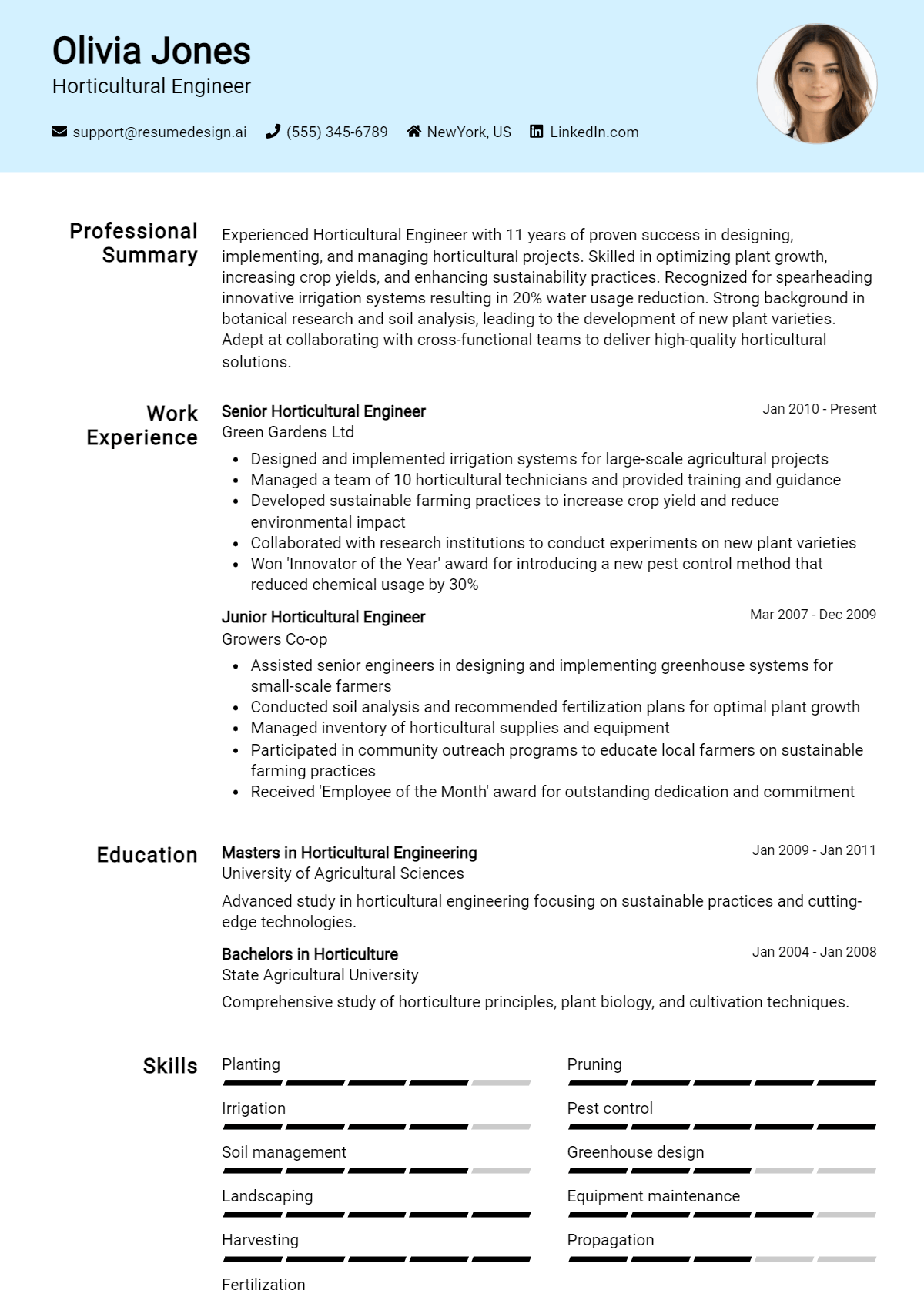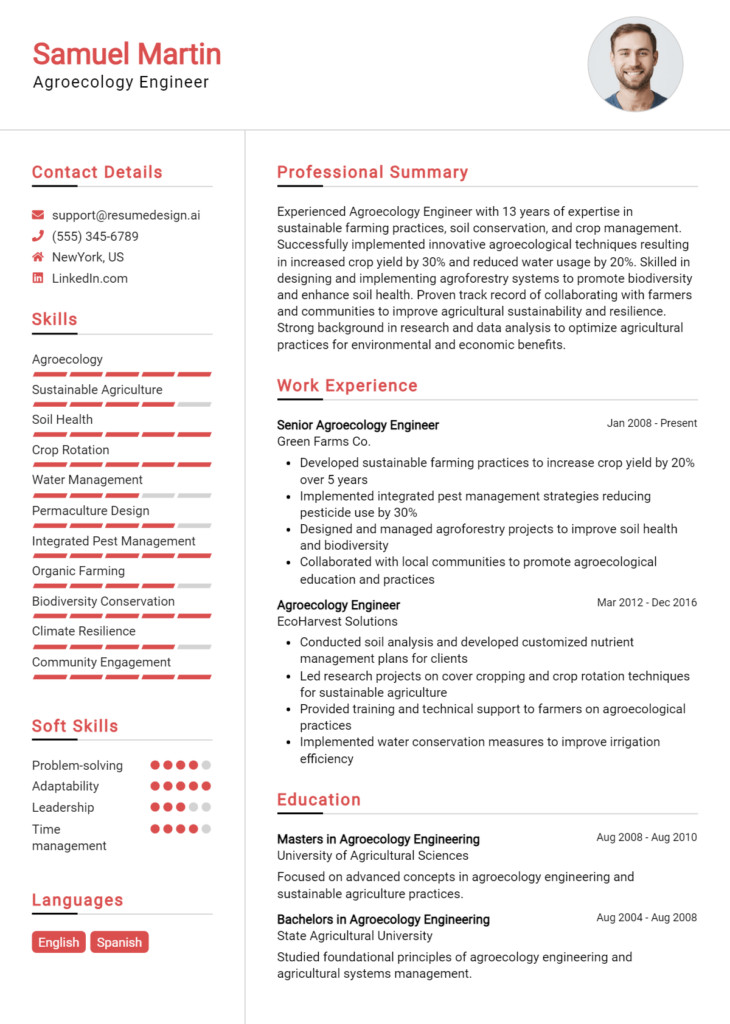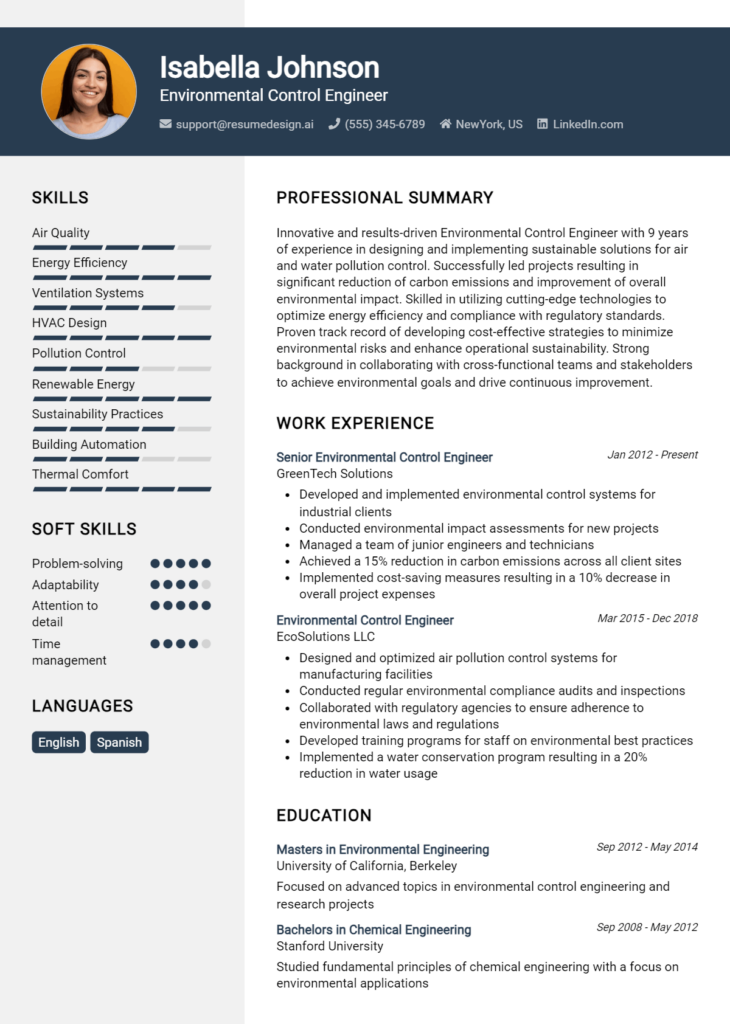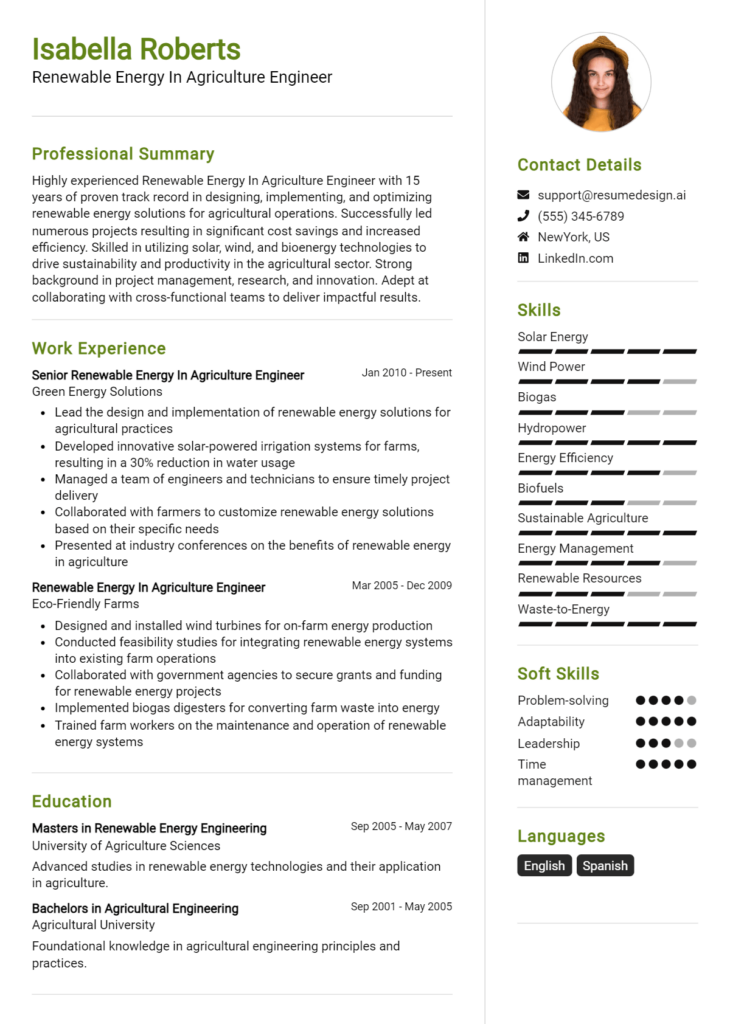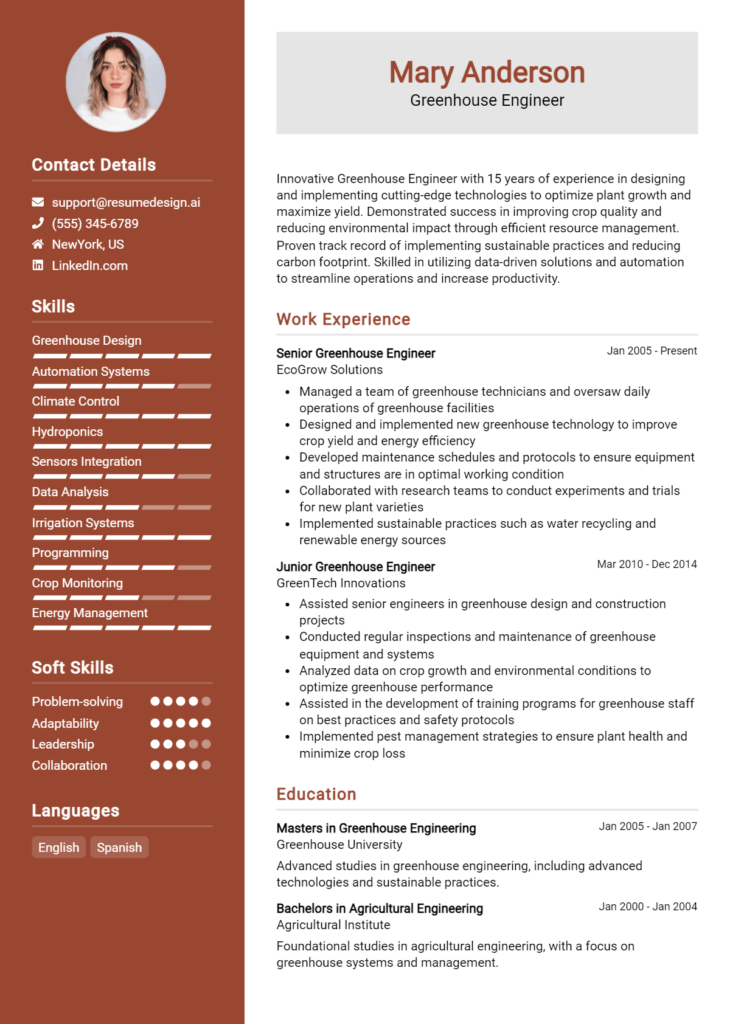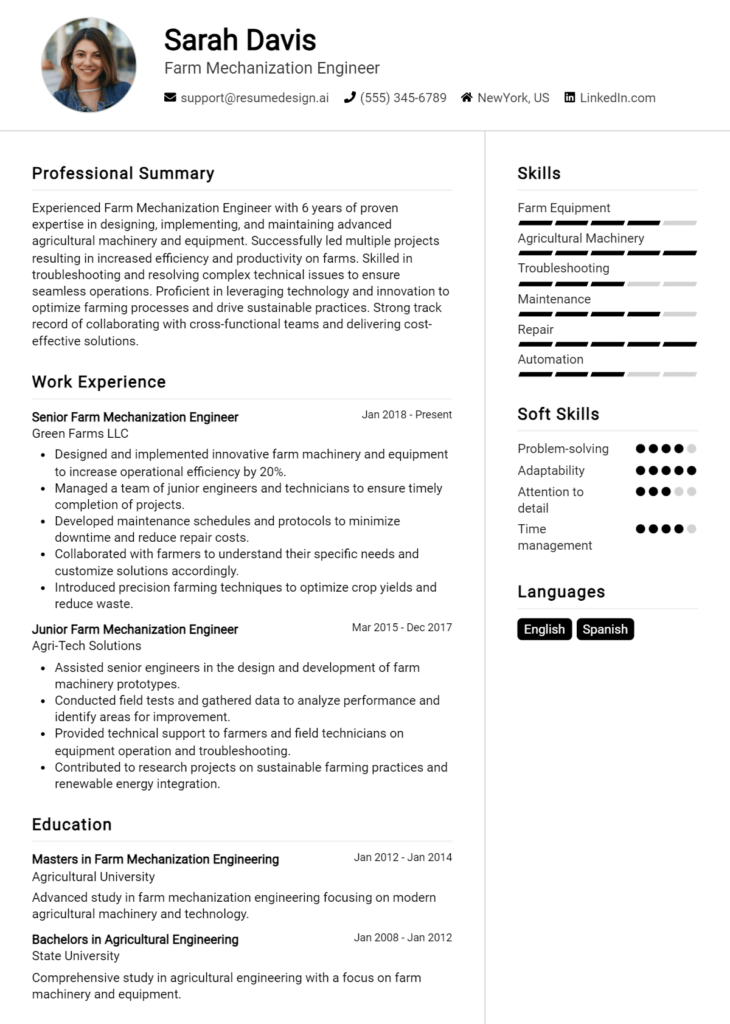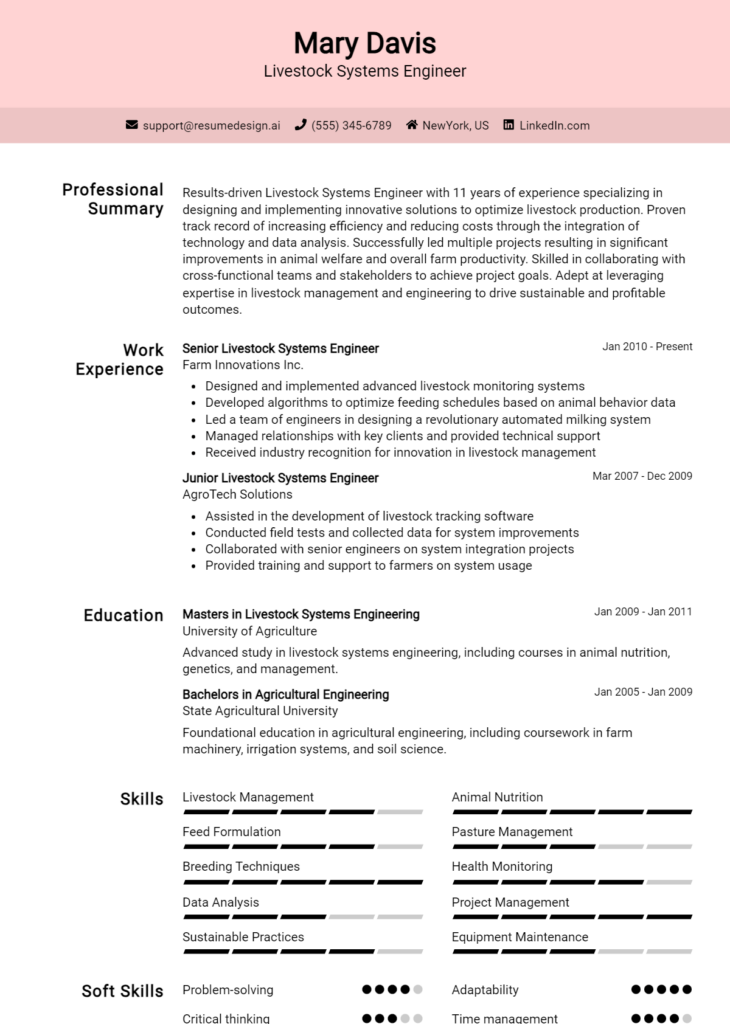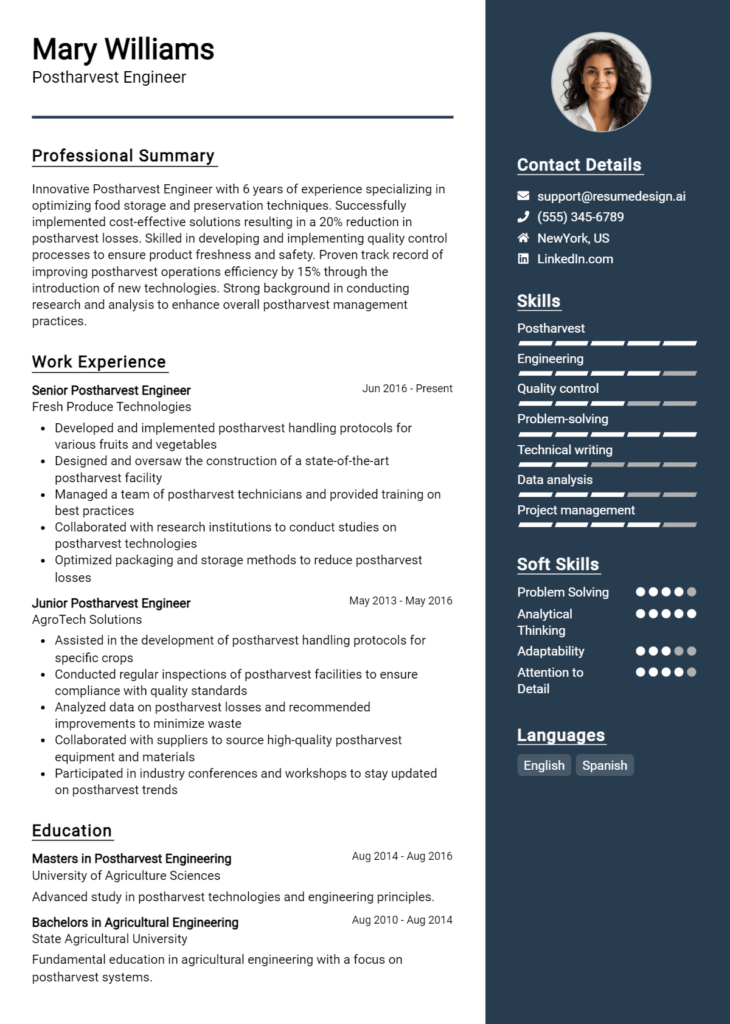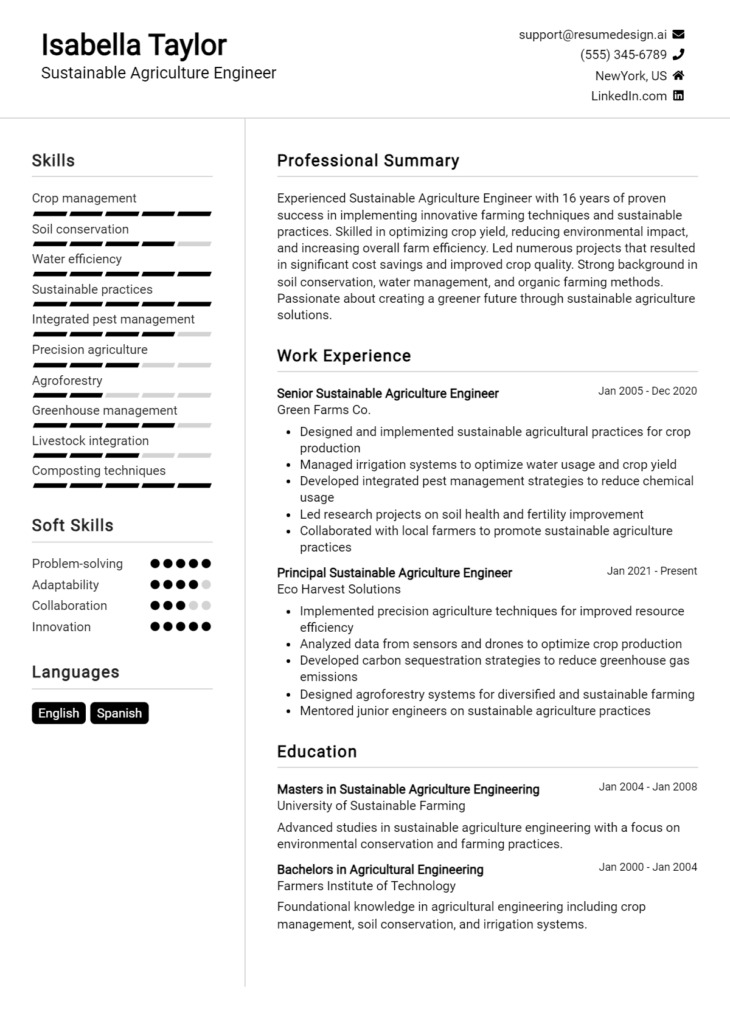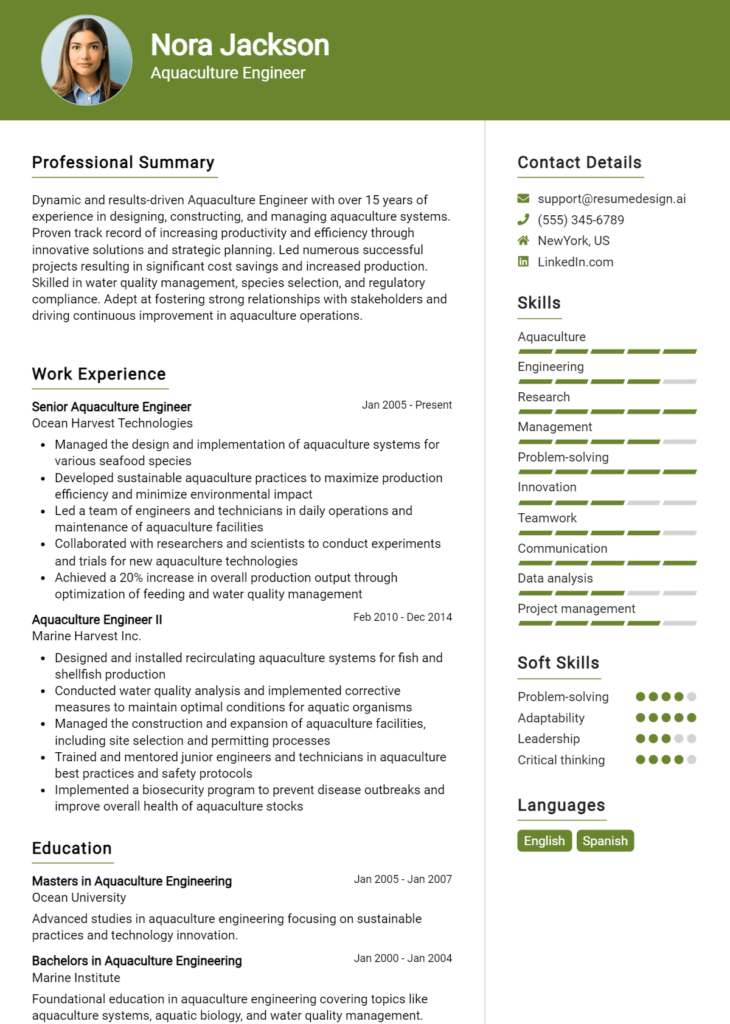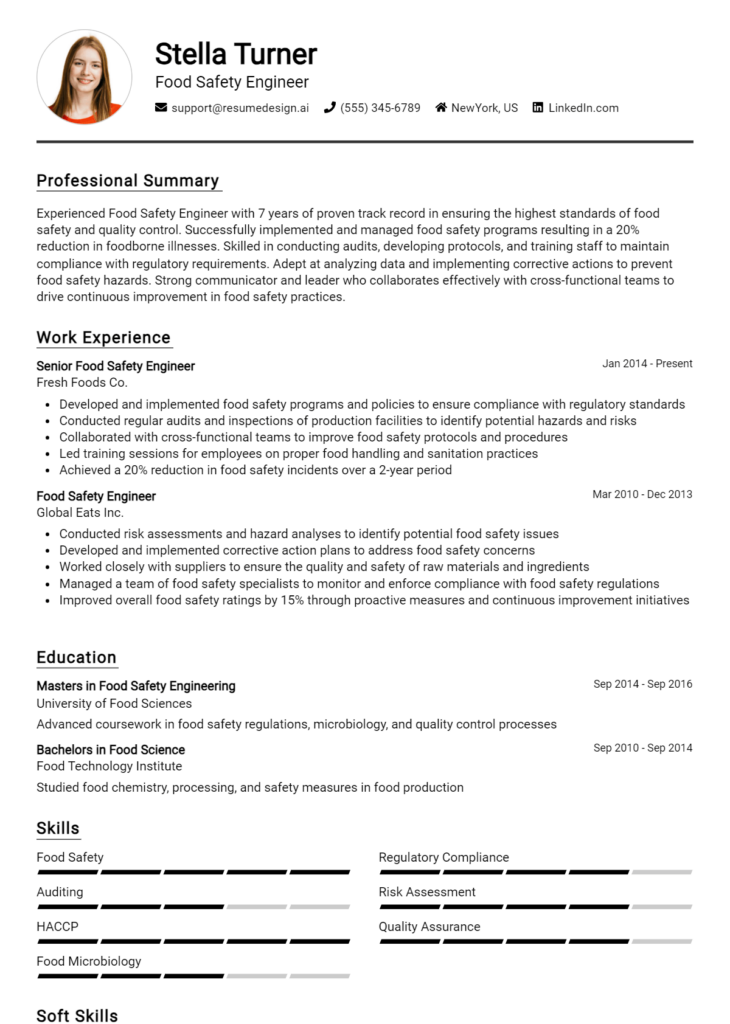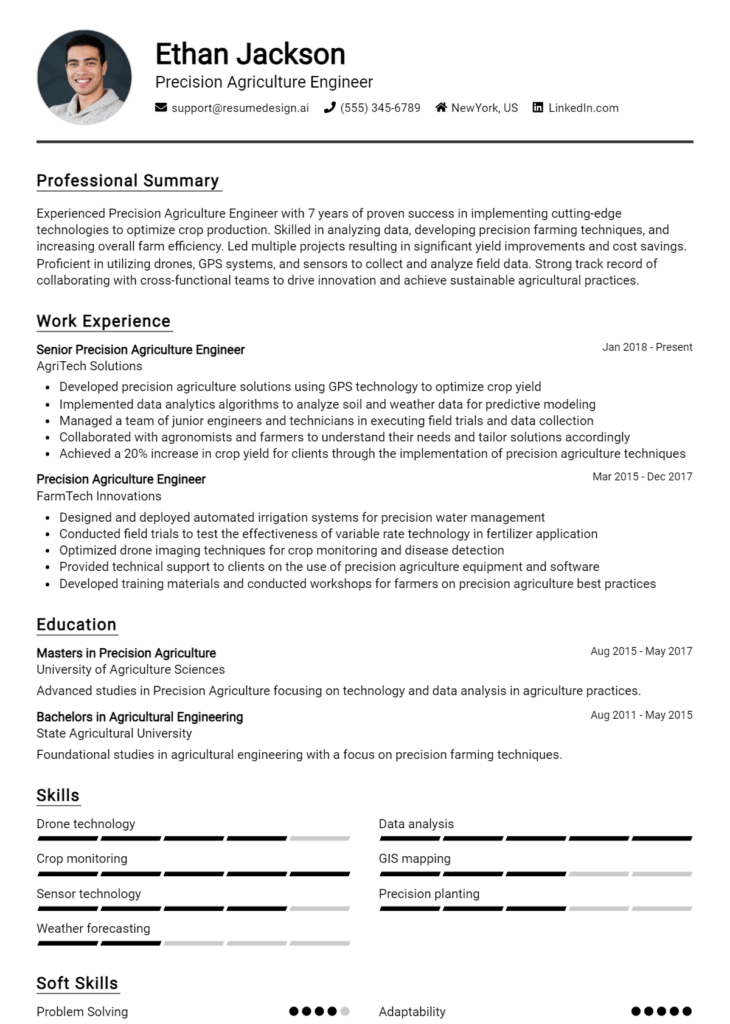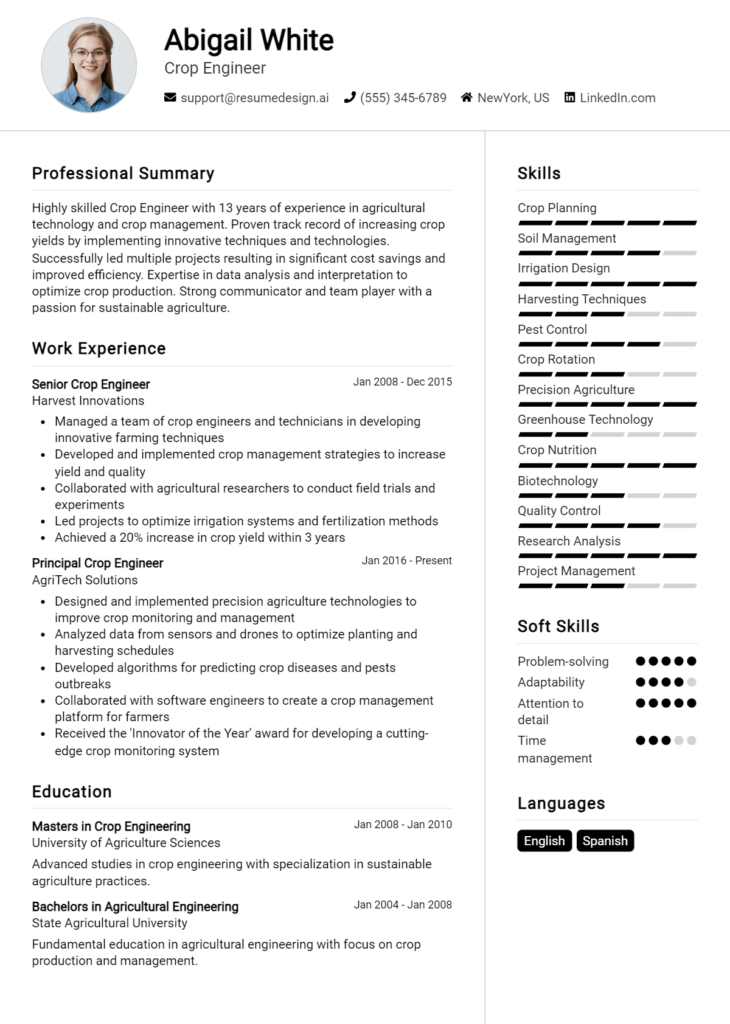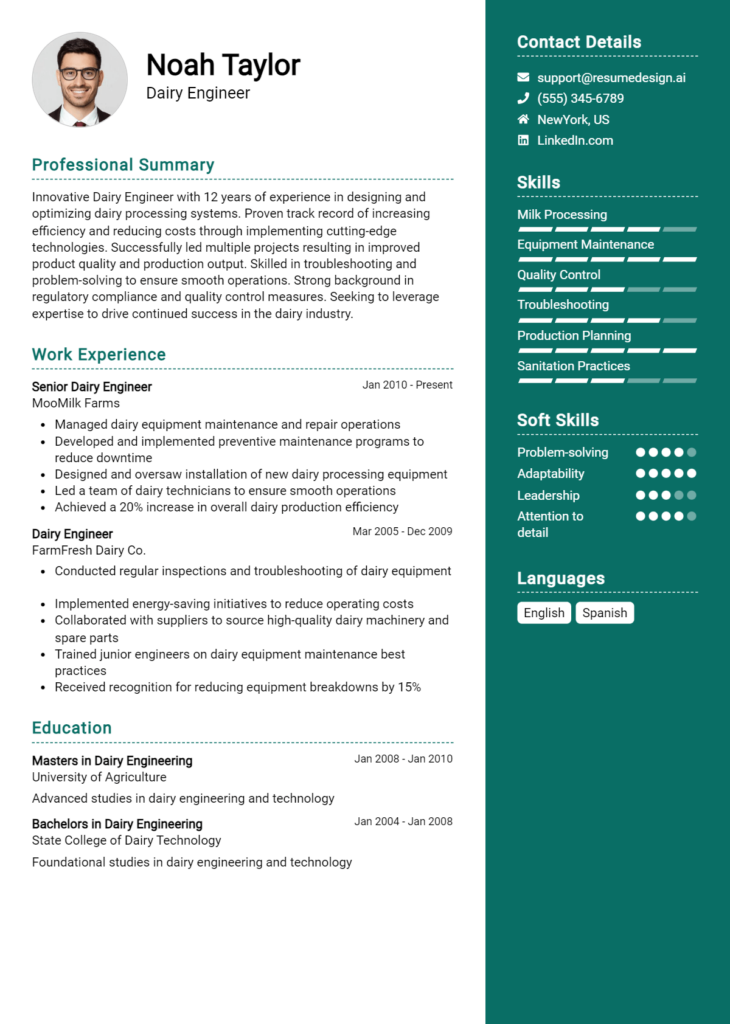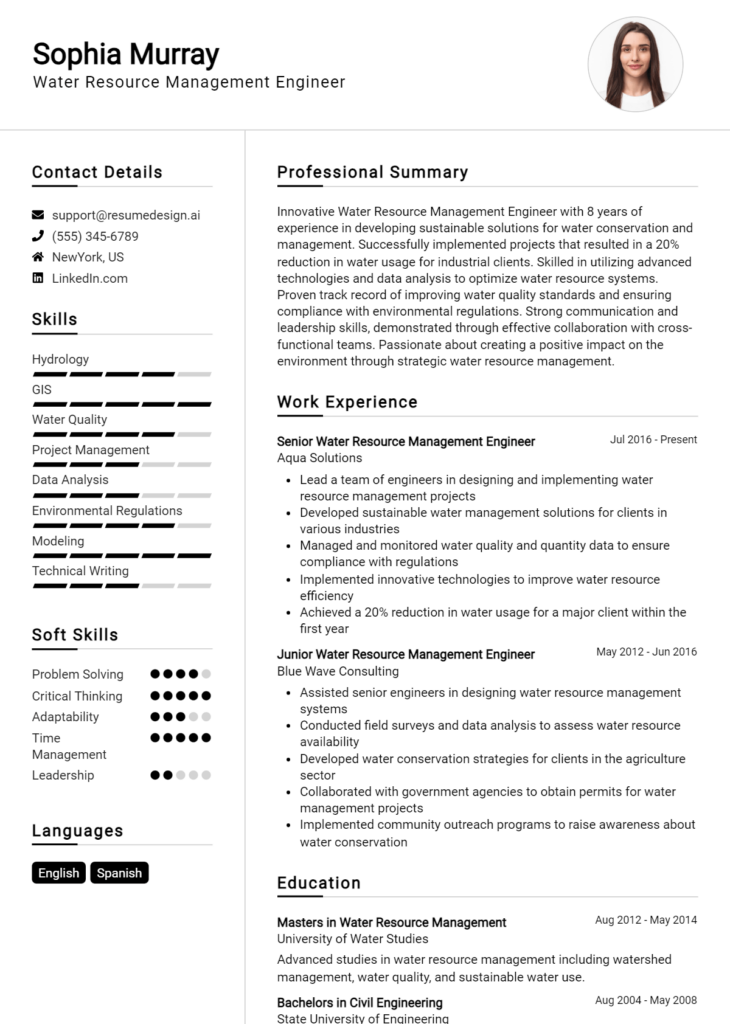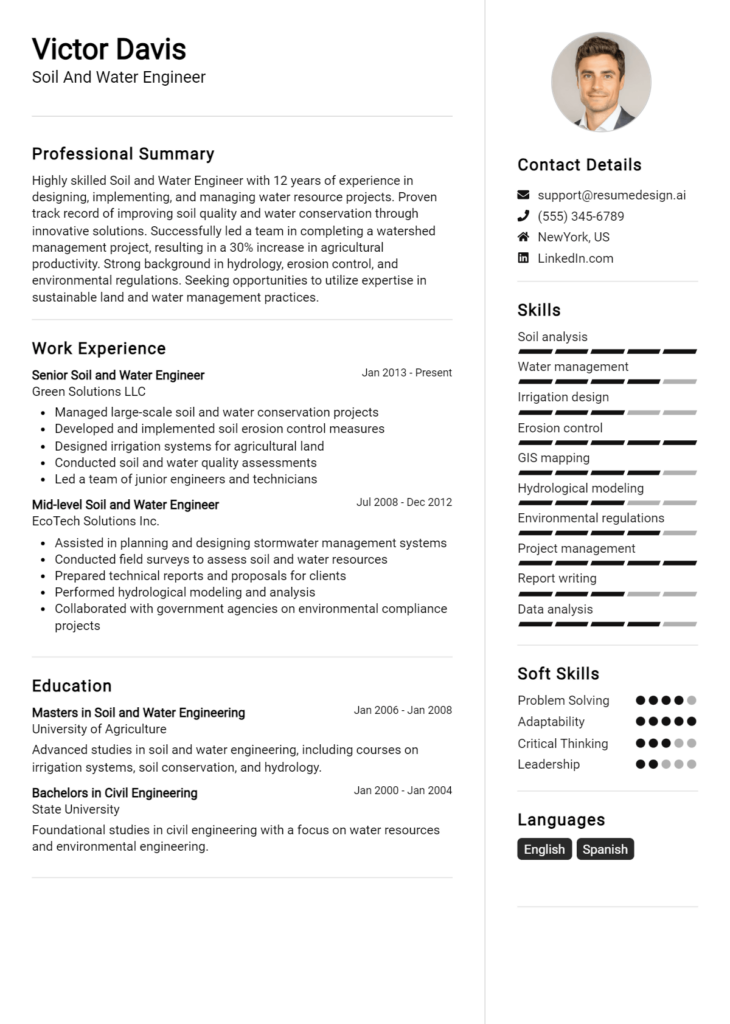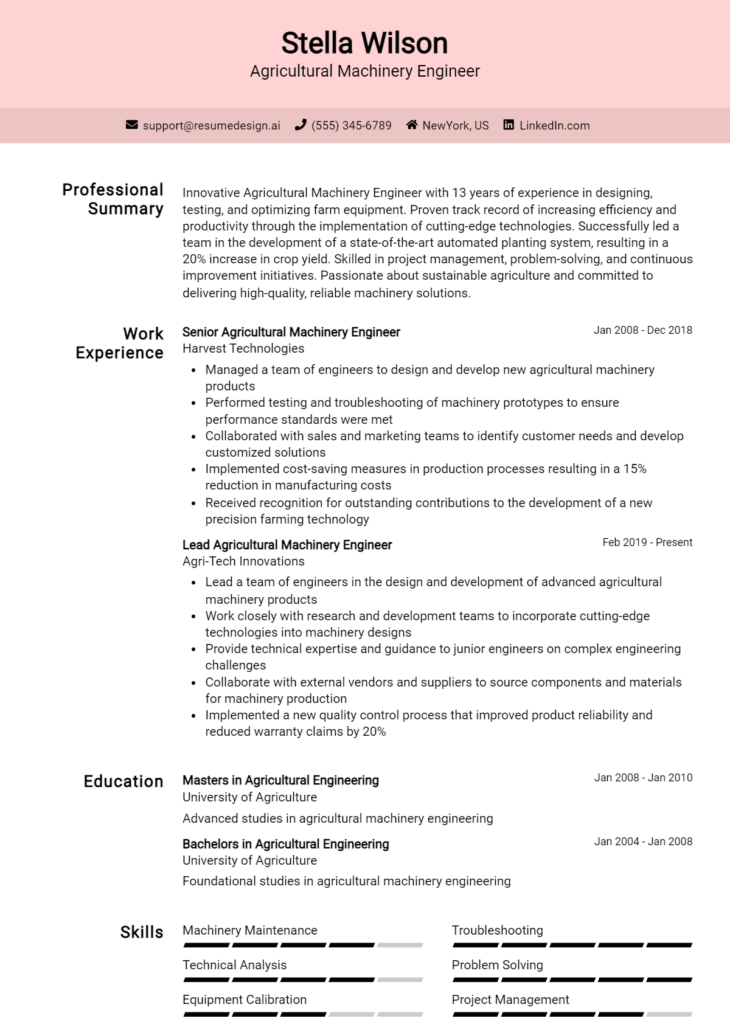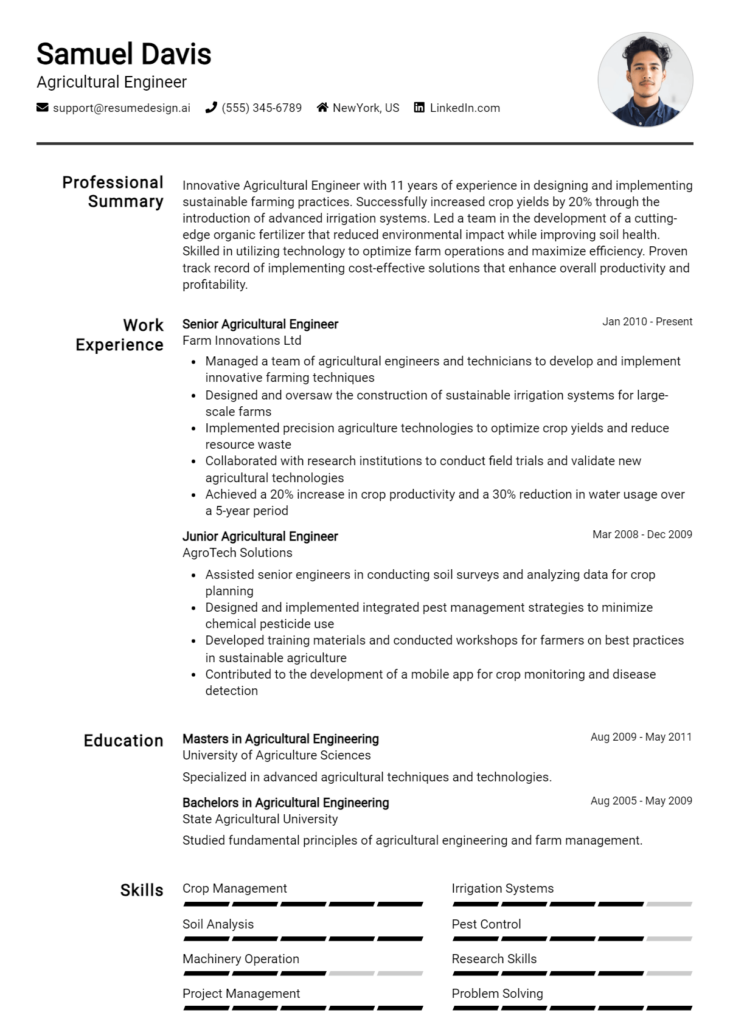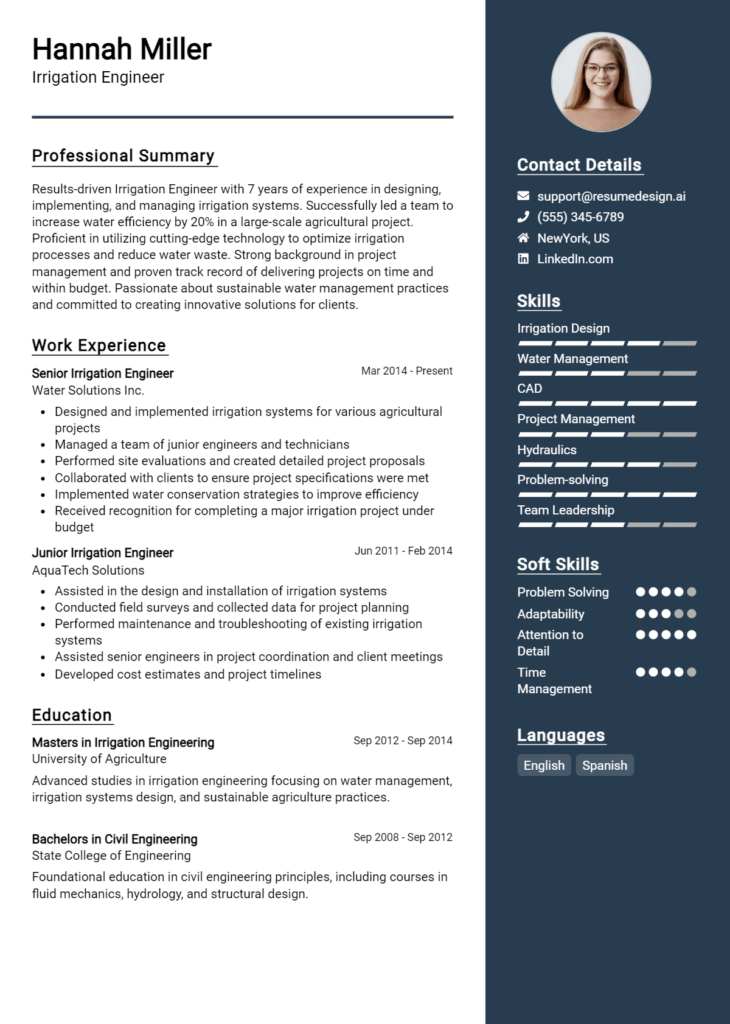Horticultural Engineer Core Responsibilities
The role of a Horticultural Engineer involves designing and implementing sustainable agricultural systems, focusing on plant growth, soil health, and environmental impact. Key responsibilities include collaborating with agronomists, environmental scientists, and agricultural technicians to optimize crop production and resource management. Essential skills encompass technical expertise in horticultural practices, operational efficiency, and advanced problem-solving abilities. These skills are crucial in achieving organizational goals, and a well-structured resume can effectively highlight these qualifications to prospective employers.
Common Responsibilities Listed on Horticultural Engineer Resume
- Design and develop innovative horticultural systems and practices.
- Conduct research on plant varieties and growth conditions.
- Analyze soil and environmental data to enhance crop yield.
- Collaborate with cross-functional teams to implement sustainable practices.
- Manage irrigation systems and water conservation techniques.
- Develop pest and disease management strategies.
- Prepare technical reports and presentations for stakeholders.
- Implement greenhouse design and management protocols.
- Evaluate and select appropriate horticultural technologies.
- Ensure compliance with environmental regulations and standards.
- Train and supervise staff on horticultural best practices.
- Monitor and assess project outcomes for continuous improvement.
High-Level Resume Tips for Horticultural Engineer Professionals
In the competitive field of horticultural engineering, a well-crafted resume serves as your primary marketing tool, often being the first impression you make on potential employers. A resume should not only highlight your technical skills and expertise in areas such as landscape design, plant biology, and sustainable practices but also showcase your notable achievements in previous roles. As the horticultural sector continues to evolve, it’s essential that your resume reflects both your ability to adapt and your commitment to fostering ecological balance through innovative engineering solutions. This guide will provide practical and actionable resume tips specifically tailored for horticultural engineering professionals, empowering you to stand out in a crowded job market.
Top Resume Tips for Horticultural Engineer Professionals
- Tailor your resume to each job description by incorporating relevant keywords and phrases from the posting.
- Highlight your relevant experience, focusing on roles and projects that directly relate to horticultural engineering.
- Quantify your achievements using metrics such as percentage increases in crop yields, cost savings, or project timelines.
- Showcase industry-specific skills including knowledge of plant genetics, soil management, and irrigation systems.
- Include any certifications or licenses relevant to horticultural engineering, such as landscape architecture or pest management certifications.
- Utilize a clean and professional format that enhances readability, ensuring that important information stands out.
- Incorporate a summary statement at the beginning of your resume that captures your career objectives and key competencies.
- Emphasize your teamwork and communication skills, as collaboration is often essential in horticultural projects.
- List any professional memberships or affiliations with horticultural organizations, demonstrating your commitment to the field.
Implementing these tips can significantly enhance your resume, increasing your chances of landing a job in the horticultural engineering field. By effectively showcasing your skills, achievements, and industry knowledge, you will not only attract the attention of hiring managers but also position yourself as a strong candidate ready to contribute to innovative horticultural solutions.
Why Resume Headlines & Titles are Important for Horticultural Engineer
In the competitive field of horticultural engineering, a well-crafted resume headline or title serves as a powerful tool that can significantly influence a hiring manager's first impression. A strong headline provides an immediate snapshot of a candidate's qualifications, showcasing their expertise and aligning it with the specific role they are applying for. This concise yet impactful phrase not only grabs attention but also succinctly summarizes the candidate's strengths, making it easier for recruiters to assess their fit for the position. By ensuring that the headline is relevant and tailored to the job description, candidates can effectively set themselves apart from the competition.
Best Practices for Crafting Resume Headlines for Horticultural Engineer
- Keep it concise: Aim for a clear, succinct headline that captures your main qualifications in a few words.
- Be role-specific: Tailor the headline to reflect the specific position of horticultural engineer you are applying for.
- Highlight key skills: Incorporate essential skills or areas of expertise that align with the job requirements.
- Use impactful language: Choose strong action words or adjectives that convey your strengths effectively.
- Avoid jargon: Ensure the language is accessible and understandable to all potential readers.
- Position your headline strategically: Place it at the top of your resume to ensure it is the first thing hiring managers see.
- Reflect your experience level: Indicate whether you are an entry-level, mid-career, or senior professional to manage expectations.
- Update regularly: Revise your headline for each application to reflect the most relevant qualifications for the role.
Example Resume Headlines for Horticultural Engineer
Strong Resume Headlines
Innovative Horticultural Engineer Specializing in Sustainable Landscape Design
Experienced Horticultural Engineer with 10+ Years in Precision Agriculture
Results-Driven Horticultural Engineer Focused on Eco-Friendly Solutions
Expert Horticultural Engineer with Proven Track Record in Crop Yield Optimization
Weak Resume Headlines
Horticultural Engineer Seeking Job
Experienced Engineer
Looking for Opportunities in Horticulture
The strong headlines are effective because they clearly communicate the candidate's expertise and specific areas of focus, immediately resonating with the hiring manager's needs. They demonstrate a clear alignment with the role and highlight the candidate's unique value proposition. Conversely, the weak headlines fail to impress due to their vagueness and lack of specific information, making it difficult for recruiters to gauge the applicant's qualifications or interest in the position. A well-defined headline can make all the difference in capturing the attention of potential employers.
Writing an Exceptional Horticultural Engineer Resume Summary
A well-crafted resume summary is crucial for Horticultural Engineers as it serves as the first impression for hiring managers. This brief introduction encapsulates the candidate's key skills, relevant experience, and notable accomplishments, allowing hiring managers to quickly assess the candidate's fit for the role. A strong summary is not only concise and impactful but also tailored to align with the specific job description, making it an essential component of an effective resume.
Best Practices for Writing a Horticultural Engineer Resume Summary
- Quantify achievements with specific metrics to demonstrate impact and effectiveness.
- Focus on key skills relevant to horticultural engineering, such as project management, plant physiology, and sustainable practices.
- Tailor the summary to the job description by incorporating keywords and phrases from the listing.
- Keep it concise, ideally between 3-5 sentences, to maintain the reader's attention.
- Highlight relevant certifications or degrees that enhance credibility in the field.
- Use action-oriented language to convey confidence and proactivity.
- Incorporate industry-specific terminology to showcase expertise and familiarity.
- Avoid clichés and generic statements that do not add value to the summary.
Example Horticultural Engineer Resume Summaries
Strong Resume Summaries
Results-driven Horticultural Engineer with over 7 years of experience in sustainable landscaping design, achieving a 30% reduction in water usage for commercial projects. Proven track record in managing cross-functional teams and executing large-scale horticultural initiatives.
Innovative Horticultural Engineer with a Master's degree in Plant Sciences and expertise in precision agriculture. Successfully increased crop yield by 25% through the implementation of advanced irrigation systems and soil health monitoring techniques.
Dedicated Horticultural Engineer skilled in developing eco-friendly practices, with a focus on native plant restoration. Led a team that restored 50 acres of degraded land, enhancing biodiversity and community engagement.
Weak Resume Summaries
Experienced horticulturist who has worked on various projects and has a good understanding of plants.
Horticultural Engineer looking for a new opportunity to utilize skills in gardening and landscaping.
The strong resume summaries stand out because they quantify achievements, demonstrate specific expertise, and directly relate to the horticultural engineering field. They are action-oriented and tailored to highlight relevant skills and experiences. In contrast, the weak summaries lack specificity, measurable outcomes, and fail to convey a strong sense of expertise or relevance, making them less effective in capturing the attention of hiring managers.
Work Experience Section for Horticultural Engineer Resume
The work experience section of a Horticultural Engineer resume is a critical component that allows candidates to demonstrate their technical expertise and practical application of horticultural principles in real-world scenarios. This section not only highlights the ability to manage teams effectively but also showcases the candidate's commitment to delivering high-quality products that meet industry standards. By quantifying achievements and aligning past experiences with the specific requirements of the horticultural industry, candidates can provide potential employers with a clear picture of their capabilities and contributions to previous roles.
Best Practices for Horticultural Engineer Work Experience
- Use action verbs to begin each bullet point, clearly indicating your role in each task.
- Quantify achievements with specific numbers, such as percentage improvements or cost reductions.
- Highlight leadership roles and team management experiences to demonstrate collaboration and interpersonal skills.
- Include industry-relevant keywords to align your experience with job descriptions and industry standards.
- Focus on technical skills and tools used, showcasing your expertise in horticultural engineering technologies.
- Detail specific projects or initiatives that illustrate your problem-solving abilities and innovative thinking.
- Tailor each entry to reflect the responsibilities and successes relevant to the job you are applying for.
- Keep descriptions concise and impactful, focusing on your contributions and the results achieved.
Example Work Experiences for Horticultural Engineer
Strong Experiences
- Led a team of engineers to design and implement a sustainable irrigation system, resulting in a 30% reduction in water usage for a 500-acre agricultural project.
- Developed and executed a comprehensive pest management strategy that decreased crop losses by 25%, enhancing overall yield and profitability.
- Collaborated with cross-functional teams to improve soil health management practices, increasing organic matter by 15% over two growing seasons.
- Managed the installation of advanced greenhouse technologies, leading to a 40% increase in production efficiency and a 20% decrease in energy costs.
Weak Experiences
- Worked on various horticultural projects without specific details about outcomes or responsibilities.
- Assisted in team efforts without clarifying my role or contributions to the projects.
- Involved in general maintenance tasks that did not highlight any significant achievements or technical skills.
- Participated in meetings and discussions without noting any specific impact or results from those interactions.
The examples provided illustrate the distinction between strong and weak experiences in a resume. Strong experiences convey clear, quantifiable outcomes and specific responsibilities that reflect technical leadership and collaboration. Conversely, weak experiences lack detail and fail to demonstrate the candidate's unique contributions or achievements, making them less impactful to potential employers.
Education and Certifications Section for Horticultural Engineer Resume
The education and certifications section of a Horticultural Engineer resume is crucial for showcasing a candidate's academic background, specialized training, and commitment to continuous professional development. This section serves as a platform to highlight degrees and certifications that are directly relevant to the horticultural field, demonstrating the candidate's preparedness for the role. By providing detailed information about relevant coursework, specialized training, and industry-recognized credentials, candidates can enhance their credibility and effectively align themselves with the job requirements, making a strong impression on potential employers.
Best Practices for Horticultural Engineer Education and Certifications
- Include degrees from accredited institutions relevant to horticulture, agronomy, or environmental science.
- List industry-recognized certifications such as Certified Horticultural Professional (CHP) or Certified Landscape Technician (CLT).
- Provide details on relevant coursework that demonstrates specialized knowledge in areas like plant biology, soil science, and landscape design.
- Highlight any advanced degrees (e.g., Master's or Ph.D.) that may set you apart from other candidates.
- Incorporate dates of completion for degrees and certifications to indicate recent educational efforts.
- Emphasize participation in workshops, seminars, or ongoing education initiatives that reflect a commitment to staying current in the field.
- Use clear formatting to ensure that information is easy to read and navigate for hiring managers.
Example Education and Certifications for Horticultural Engineer
Strong Examples
- Bachelor of Science in Horticulture, University of California, Davis, 2020
- Certified Horticultural Professional (CHP), American Society of Horticultural Science, 2021
- Advanced Landscape Design Course, Purdue University, 2022
- Master’s Degree in Environmental Science, University of Florida, 2023
Weak Examples
- Associate Degree in General Studies, Community College, 2015
- Certification in Basic Computer Skills, 2018
- Old Certificate in Gardening Techniques (1990)
- High School Diploma, 2010
The strong examples listed above are considered robust because they reflect relevant education and certifications that align directly with the expectations for a Horticultural Engineer. They demonstrate advanced learning, specialized knowledge, and a commitment to the field, thereby enhancing the candidate's appeal to employers. In contrast, the weak examples lack relevance to the horticultural industry and include outdated qualifications that do not contribute to the candidate's suitability for the role. This distinction underscores the importance of including pertinent and recent educational achievements in a resume.
Top Skills & Keywords for Horticultural Engineer Resume
When crafting a resume for a Horticultural Engineer position, highlighting the right skills is crucial to demonstrating your qualifications and expertise in this specialized field. A well-structured skills section not only showcases your technical abilities but also reflects your problem-solving capabilities and adaptability in varied horticultural environments. Employers seek candidates who possess a blend of hard and soft skills, as these attributes are essential for success in managing complex horticultural projects, collaborating with teams, and innovating sustainable solutions. This article explores the essential skills that should be included in your resume to stand out in the competitive job market.
Top Hard & Soft Skills for Horticultural Engineer
Soft Skills
- Strong communication skills
- Team collaboration and leadership
- Critical thinking and problem-solving
- Time management and organization
- Adaptability and flexibility
- Creativity and innovation
- Attention to detail
- Project management
- Customer service orientation
- Effective decision-making
Hard Skills
- Knowledge of plant biology and ecology
- Proficiency in horticultural design software
- Familiarity with soil science and fertility management
- Expertise in pest and disease management
- Understanding of irrigation systems and water management
- Experience with greenhouse operations and management
- Proficiency in landscape architecture
- Strong analytical skills for data interpretation
- Knowledge of sustainable agriculture practices
- Experience with environmental regulations and compliance
For more information on essential skills and how to effectively present your work experience, consider reviewing additional resources and templates that can enhance your resume.
Stand Out with a Winning Horticultural Engineer Cover Letter
I am writing to express my interest in the Horticultural Engineer position at [Company Name], as advertised on [Job Board/Company Website]. With a robust background in horticultural science and engineering, coupled with hands-on experience in sustainable agriculture practices, I am excited about the opportunity to contribute to your team's innovative projects. My academic credentials, including a Bachelor’s degree in Horticultural Engineering and a Master’s degree in Environmental Science, have equipped me with a deep understanding of plant biology, soil management, and water conservation techniques, which are essential in enhancing agricultural productivity and environmental sustainability.
In my previous role at [Previous Company Name], I successfully led a project aimed at developing a hydroponic system that increased crop yield by 30% while significantly reducing water usage. Collaborating with cross-functional teams, I utilized advanced engineering principles to design and implement effective irrigation systems that not only improved efficiency but also minimized environmental impact. My commitment to research and development has allowed me to stay at the forefront of horticultural technology, including the use of precision agriculture and smart farming techniques, which I believe align perfectly with [Company Name]'s mission of sustainability and innovation.
I am particularly drawn to this position at [Company Name] because of your commitment to advancing sustainable horticultural practices. I am eager to bring my expertise in plant genetics, soil science, and sustainable design to your team. I am confident that my ability to analyze complex data and my passion for developing environmentally friendly solutions would make a valuable contribution to your ongoing projects and initiatives. I look forward to the possibility of discussing how I can help drive [Company Name]'s goals forward.
Thank you for considering my application. I am excited about the opportunity to join your team and contribute to the future of horticultural engineering at [Company Name]. I hope to discuss my application in further detail and am looking forward to your response.
Common Mistakes to Avoid in a Horticultural Engineer Resume
Crafting a compelling resume as a Horticultural Engineer is crucial to standing out in a competitive job market. However, many applicants make common mistakes that can hinder their chances of landing an interview. Understanding these pitfalls can help you create a more effective resume that highlights your qualifications and experience. Here are some common mistakes to avoid:
Generic Objective Statements: Using a one-size-fits-all objective can make your resume feel impersonal. Tailor your objective to reflect your specific career goals and how they align with the job you are applying for.
Lack of Relevant Keywords: Failing to incorporate industry-specific keywords can lead to your resume being overlooked by applicant tracking systems. Research job descriptions to identify key terms and phrases that resonate with the role.
Overloading with Unrelated Experience: Including too much irrelevant work experience can dilute your qualifications. Focus on showcasing experiences that highlight your skills and contributions in horticulture and engineering.
Neglecting Quantifiable Achievements: Simply listing job duties without quantifying your achievements can make your contributions seem less impactful. Use numbers and metrics to demonstrate your successes, such as project outcomes or efficiency improvements.
Poor Formatting and Design: An unorganized or cluttered resume can be difficult to read. Use clear headings, bullet points, and consistent formatting to enhance readability and ensure your information is easily accessible.
Ignoring Soft Skills: While technical skills are essential for a Horticultural Engineer, neglecting to mention soft skills like communication, teamwork, and problem-solving can be a mistake. Highlight how these skills have contributed to your success in past roles.
Omitting Continuing Education: The field of horticulture is continually evolving. Failing to include relevant certifications, workshops, or courses can indicate a lack of commitment to professional development. Be sure to showcase any ongoing education that enhances your qualifications.
Typos and Grammatical Errors: Submitting a resume filled with errors can detract from your professionalism. Always proofread your resume multiple times or ask someone else to review it to catch any mistakes before submission.
Conclusion
In this article, we explored the crucial role of a Horticultural Engineer, emphasizing the blend of science, technology, and creativity required in this field. We discussed the key responsibilities, including designing sustainable landscapes, developing advanced irrigation systems, and enhancing plant health through innovative techniques. The importance of staying updated with the latest horticultural practices and technologies was also highlighted, as the industry continuously evolves to address environmental challenges and meet growing demands for food and ornamental plants.
As you reflect on your career as a Horticultural Engineer, it's essential to ensure your resume stands out in a competitive job market. Now is the perfect time to review and refine your Horticultural Engineer Resume, tailoring it to showcase your unique skills and experiences effectively.
To assist you in this process, take advantage of the available resources that can elevate your application materials. Check out the resume templates to find a design that fits your style, use the resume builder for a step-by-step creation process, review resume examples to draw inspiration from successful peers, and consider the cover letter templates to accompany your resume with a compelling introduction.
Don't miss the opportunity to enhance your chances of landing your dream job in horticultural engineering—start updating your resume today!

